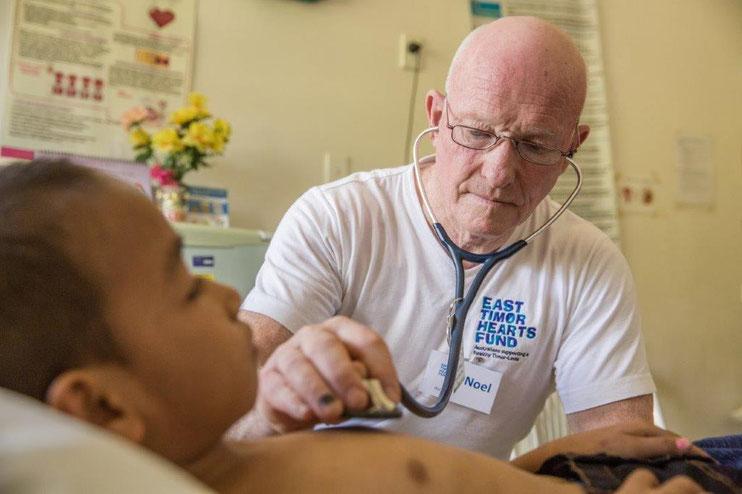Landmark heart study to screen 1000 Timorese children

A team of Australian cardiologists and other medical specialists is assembling in Dili, the capital of Timor-Leste (East Timor), ready to commence a landmark heart disease prevalence study.
Up to one thousand school children, in Dili and outlying districts, will be screened as part of the study, the first of its kind conducted in Timor-Leste, which aims to estimate the prevalence of rheumatic heart disease (RHD) in the country.
RHD is a preventable, treatable form of cardiovascular disease that affects more than 32 million people around the world, and claims 275,000 lives a year. The prevalence of the disease has never been measured in Timor-Leste, despite many young people who have advanced heart disease.
Dr Noel Bayley, honorary medical adviser of the Australian medical aid charity East Timor Hearts Fund, said the organisation was funding the study as part of push to tackle the root causes of poor heart health in Timor-Leste.
“Since 2010 East Timor Hearts Fund has provided heart surgery or procedures in Australia for more than 30 patients, the vast majority of whom have been young people with RHD,” Dr Bayley said.
“While continuing to assist individual patients, we also want to start to look at the systemic issues.
“Anecdotally we know that there is a very high rate of RHD in Timor-Leste. This study aims to quantify that more precisely, and provide a platform for East Timor Hearts Fund and other non-government and government organisations to begin to marshal the funding and resources needed to effectively tackle this devastating disease.”
The study is the result of collaboration between East Timor Hearts Fund, RhEACH – a founding member of RHD Action – and local partners Bairo Pite Clinic and St John of God Timor-Leste.
Between Monday 10 October and Friday 14 October a team of four cardiologists and other medical specialists, nurses and support staff from around Australia and from Timor-Leste will commence the echocardiography screening study, which will develop a picture of how widespread RHD is among children and young adults in Timor-Leste. The medical team will examine children from schools in the capital of Dili, and the village of Letefoho, in Ermera district, south-west of the capital.
Treatment will be made available to children identified with RHD or skin conditions that can lead to it. Where children are found to have RHD, families will be offered the option of penicillin treatment, immediately and ongoing. East Timor Hearts Fund is also funding an expanded prophylactic penicillin program via Bairo Pite Clinic in Dili, supported by a donation of medication from Pfizer.
Understanding the burden of RHD in Timor-Leste will help us understand what can be done to tackle the disease,” said Dr Joshua Francis, a paediatric infectious disease specialist from Darwin, who is participating in the study.
“Prevention of these severe cases of RHD would not only be cost-effective for the health system in Timor-Leste, it would also spare a significant number of children and young people in Timor-Leste from suffering, and even dying from, a completely preventable disease.”
More information:
RHD Action Global Status Report 2015-17 (For a case study of Timor-Leste and RHD)
East Timor Hearts Fund
RhEACH





